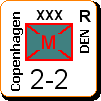MajorDude
Posts: 199
Joined: 1/20/2009
Status: offline

|
quote:
ORIGINAL: Shannon V. OKeets
quote:
ORIGINAL: Orm
quote:
Warspite1
Do you not see Napoleon as a villain Orm?
I am not quite sure what he did that makes him qualify as a villain. He was involved in numerous wars but alot of them was more of a reaction that most of Europe did not accept revolutionary France (or Napoleon). It might be that he is a villian but so far he seems, to me, as bad (or good) as his contemporary statesmen in other countries.
I do, however, confess that my knowledge on Napoleon and his actions are not as complete as I would like. So I would appreciate if someone could educate me to why Napoleon is considered a villain.
To a large degree, one's perception of Napoleon depends on one's country of birth.
For instance, I just started reading Churchill's 6 volume set on WWII and I am struck by his opinion that a major difficulty for Germany in the years between the wars was that they did not have a monarch to serve as a unifying element for the populace. Being an American, it would never have occurred to me that lack of a monarch could be a fatal omission in a government. Churchill was a wise and very knowledgeable politician during those years, so his opinion can not be dismissed out-of-hand. But clearly he had a strong bias on this subject. Astonishingly so to me.
EDIT: And to bring this post back on topic, Churchill personally and the Admiralty in general were very concerned about the Italian navy versus the Royal Navy in the Mediterranean prior to WWII. Churchill gives that concern (that the Italians might have been able to defeat the RN in the Med) as one of the reasons that the British did not intervene militarily with the Italian conquest of Ethiopia.
I totally agree with this.
Napoleon "inherited" a country that was still in the throes of an extremely bloody revolution, that had just failed to establish a constitutional monarchy (as in England), and now found itself guilty of regicide. It is this regicide, and the new notion that countries and governments do not require a monarchical dynasty and a "blooded" nobility to exist, that was rightly seen by the remaining monarchs and nobles in Europe as real threat to their very existence.
Napoleon grabbed the reins of this "esprit de nation", modernized the country's industry and military, and did what Napoleon became famous for - strike first, divide, and conquer. This expansion into Europe did bring "republican" ideals (freedom, equality) and laws (Code Napoleon) to areas that had mostly always been under the yoke of one monarchy or another. It is even a bit ironic that a lot of this "fraternization" between former German principalities would in part help to pave the way for a unified Germany.
Napoleon's destiny, however, was inevitable. The further he pushed, the further he felt he needed to push. This insatiable drive only led him away from the ideals of the Republic to create an empire, much in the way the Romans had done, and much in the way that another would-be world conqueror would again try to do more than a century later.
Like him or not, the revolution changed Europe. It pushed a young Corsican artilleryman, Napoleon, to the lofty heights and aspirations of Empire. It lost it all, yet, in the end, it had forever changed this world. It had finally allowed many to realize, perhaps for the first time ever, that they too could have rights, benefit from freedom and equality, and live in a country with a government of the people, elected by the people, not by bloodlines.
Villain, hero, revolutionary, troublemaker - they all apply.
Back to topic - the Italian Navy was most defintely a strong force to be reckoned with. They just never seemed to be able to wield it in such a way as to make full use of its power.
< Message edited by MajorDude -- 4/10/2012 8:41:32 PM >
|
 Printable Version
Printable Version











 sorry my bad
sorry my bad 
 But this is what started the off topic part
But this is what started the off topic part 


 - very sad indeed
- very sad indeed 

 New Messages
New Messages No New Messages
No New Messages Hot Topic w/ New Messages
Hot Topic w/ New Messages Hot Topic w/o New Messages
Hot Topic w/o New Messages Locked w/ New Messages
Locked w/ New Messages Locked w/o New Messages
Locked w/o New Messages Post New Thread
Post New Thread